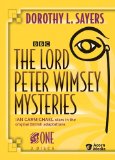| Reviews & Columns |
|
Reviews DVD TV on DVD Blu-ray 4K UHD International DVDs In Theaters Reviews by Studio Video Games Features Collector Series DVDs Easter Egg Database Interviews DVD Talk Radio Feature Articles Columns Anime Talk DVD Savant Horror DVDs The M.O.D. Squad Art House HD Talk Silent DVD
|
DVD Talk Forum |
|
|
| Resources |
|
DVD Price Search Customer Service #'s RCE Info Links |
|
Columns
|
|
|
Lord Peter Wimsey Mysteries: Set One, The
Delicious. Acorn Media has released The Lord Peter Wimsey Mysteries: Set One, a 3-disc collection of the first two Dorothy L. Sayers multi-episode adaptations undertaken by the BBC and actor Ian Carmichael back in the early 1970s. Featuring 1972's Clouds of Witness and 1973's The Unpleasantness at the Bellona Club, The Lord Peter Wimsey Mysteries: Set One is the first - I would hope - of a two-set collection, should Carmichael's remaining three Wimsey adaptations eventually be released (amateur sleuth and full-time bon vivant Wimsey himself may have exclaimed, "I ain't havin' it!" if Acorn can only release these first two films). Extras appear to be the same one included in earlier releases (two very short interview snippets with Carmichael are the only bonuses of note).
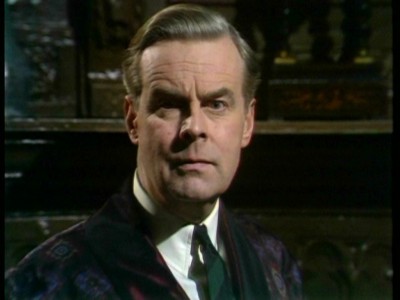
CLOUDS OF WITNESS
At Riddlesdale, the ancestral home of the Wimsey family, Gerald Wimsey, the Duke of Denver (David Langton), is having a bad time of it during his cold, snowy shooting party. Impatient, and in a foul mood (pardon me) with the day's poor bird shooting, prospects for after-dinner amusement with his stuffy weekend guests seem dim, despite the convivial air, the inviting billiard table, the good liquor, the Noel Coward songs tinkled on the piano, and a rather naughty nude post card from Corsica, sent by younger brother Lord Peter Wimsey (Ian Carmichael). Gerald's mood takes a significant downturn when something else arrives in the evening post: a letter from an old friend, Tom Freeborn, a civil engineer working in Egypt. Apparently, Freeborn knew Captain Dennis Cathcart - the long-time fiancé of Gerald's sister, Lady Mary Wimsey (Rachel Herbert) - two years before in Paris, where Cathcart made a living...cheating at cards. This angers the protective older brother (protective of both Mary and the family name), but nearly as much as Cathcart's admission that the marriage to Mary is off - and she doesn't even know it yet. Angry, violent words are exchanged as night falls deeper, until Mary, sneaking out of the house (I won't tell you why), comes across the body of Captain Cathcart...with Gerald kneeling over it. Gerald is up for murder (and suspicions fall on Mary, too), so its up to delightfully insouciant younger brother Lord Peter, with his trusty, intelligent manservant Bunter (Glyn Houston), to not only clear Gerald's name, but also discover who is the real murderer.
SPOILERS' ALERT!
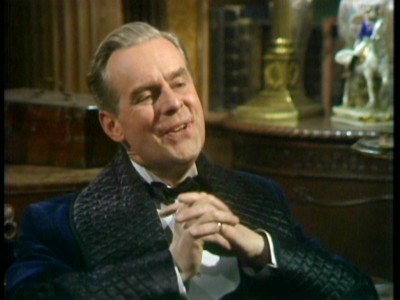
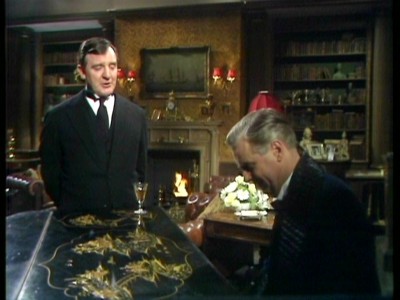
Don't worry: I wouldn't dream of spoiling the ending. It's been ages since I read a Lord Peter Wimsey detective novel, so I'm certainly no expert on the character or the books, but I must say that I was delighted with Ian Carmichael's interpretation here of Sayers' aristocratic amateur sleuth. Again, I can't speak to whether or not it's "accurate," which I suppose is a silly barometer, anyway, since individual readers fill in their own details and interpretations when they become involved in a fictional character. But it is charming and light, with a comedian's sense of pacing that's both fun and authoritative, which seems right for the Wimsey character. I do know that Carmichael is a little older here than I remember Wimsey in the earlier books (something that Carmichael admits in his bonus interview), but Carmichael has such an assured, low-key comedic ease with the character that quibbles about age quickly disappear. And make no mistake: Carmichael is, by and large, the whole show here in Clouds of Witness and later, The Unpleasantness at the Bellona Club. Anyone familiar with a typical early 1970s British television mystery won't find any surprises here in either content, performance or presentation. Alternating between grainy, dark 16mm footage for exterior scenes, and poorly-lit, noisy videotape for the all-too-obviously studio-bound interiors, the visual schematics of Clouds of Witness and later, The Unpleasantness at the Bellona Club follow standard TV conventions of the time: close-ups pulling back to master shots, with A-B-C editing back and forth between the talking heads. The actual mechanics of working out the mysteries through the camerawork and editing aren't terribly innovative or even, one might say, energetic (compare the level of storytelling - strictly from a technical aspect - from a British telemovie like Clouds of Witness, to any one of literally hundreds of American TV episodes at that time, and the difference is startling).
Of course, what distinguishes these earlier TV efforts are the sterling British casts, where even the smallest roles were filled by accomplished performers who moved freely from stage to TV studio to film (unlike Hollywood at the time, when performers tended to stay within their proscribed mediums). Carmichael, a veteran of theater, musical revues, classic British comedy films (I loved him in I'm All Right, Jack and School for Scoundrels), and television (I prefer his Bertie Wooster to the better-known Hugh Laurie interpretation...and Dennis Price's Jeeves to Stephen Fry's, for that matter), had tried to get a TV version of Lord Peter Wimsey off the ground for some years prior to this BBC incarnation, so it's obvious it was a labor of love for the gifted actor, a character he felt particularly suited to play. Looking every inch the monied, to-the-manor-born aristocratic, with his beautifully tailored suits, his silver-tinged hair carefully combed back, and the contented air of someone accustomed to having his way without a care in the world, Carmichael effortlessly conveys the jaunty irreverence of Wimsey. Blatantly employing poor grammar ("Don't it tell you something," and "It ain't been done yet."), Wimsey not only strikes a dashing, plebeian tone but through the very obviousness of the improper grammar (and his delight in using it), makes his own breeding that much more noticeable. There's an indefinable aplomb to Carmichael's Wimsey that doesn't overemphasize the character's faults, while his comedic and dramatic skills lets him deliver lines that are at first funny, then thoughtful (funny lines abound here; my favorite it Wimsey's view on money: "Of course [it's nothing]. But if you've been brought up having it, it's a bit awkward to drop it suddenly. Like baths, you know."). The rest of the cast is excellent, as is the norm for these kinds of productions. I particularly liked Isabel Jeans as the Dowager Duchess, who's just as funny and irreverent as her son. When Lord Peter, having almost drowned in the Atlantic, comes in the nick of time to save Gerald at his trial before the House of Lords, delivering a brilliant summation of the case (full of delightful slang like "barmy," "shebang," "absolute stunner," and "bally thing"), Mother's proclamation, delivered with bemused resignation, is, "Pity he didn't shave." Although I would have liked a more involved portrait of the Wimsey/Bunter relationship (with its subtle conflicts of class consciousness versus the genuine friendship of the two men who shared the horrors of WWI), Glyn Houston is marvelous as the obedient servant who dishes out his own subtle, snobbish sarcasm aimed at his master. He'll be missed in the following film.
THE UNPLEASANTNESS AT THE BELLONA CLUB
Meeting old war friend George Fentiman (John Quentin) at his club, The Bellona, Lord Peter Wimsey (Ian Carmichael) is saddened to see his chum angry and distraught. Bitter at his personal situation (jobless, "kept" by his wife, and unable to get funds from his titled but relatively poor grandfather), George makes an obnoxious fool of himself in front of the other members - an action Lord Peter doesn't condemn because of his sympathy for George's wartime (Lord Peter suffered his own mental breakdown after his service during WWI). However, Lord Peter can't understand how it is that George's grandfather, Robert Fentiman (Terence Alexander), could die at the club, in his favorite chair by the fire, and sit there until rigor mortis set in, and all the while go unnoticed by anyone at the club. And what's more, how could the corpse suffer lock-tight rigor everywhere on his body...except his knee, off of which the corpse's leg swings freely in the breeze? And if that isn't mystery enough, Lord Peter soon finds out that Robert Fentiman's estranged sister has also died, on the same day...but when, exactly, did she die will determine who among the bickering relatives gets hundreds of thousands of pounds...and will most likely point the finger at the elusive killer.
SPOILERS' ALERT!
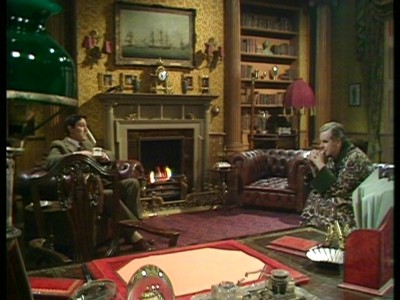
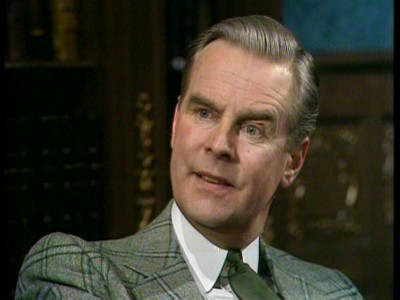
I didn't enjoy The Unpleasantness at the Bellona Club quite as much as the first film in this collection, perhaps because Carmichael's Wimsey here is just a tad more subdued, more reflective. The fun of the investigation's chase seems blunted by a more thoughtful Wimsey. Is that because the inherently more realistic context of the story - the plight of psychologically wounded soldiers - not only trumps the more cozy conventions of the murder mystery here, but also indirectly reflects back on Wimsey himself, who seems more serious and restrained because of what his friend is going through (and what indeed he went through, as well)? Carmichael gets off a fair share of witty lines, but his energy level seems decidedly lower here (he doesn't have any of the physical bits he had in the first film, which included almost drowning in "Peter's Pot" bog, or rolling down a hill, or being chased by a dog), and sadly, there's almost no chemistry between he and Derek Newark, the new Bunter. Oddly, Newark doesn't even look old enough to have served with Carmichael in the war, so they don't come off as the jabbing, jibbing "unequal equals" of the first film. And curiously, even though its run time is shorter (The Unpleasantness at the Bellona Club runs 177 minutes in four parts to Clouds of Witness' 5-part, 200+ runtime), The Unpleasantness at the Bellona Club feels much longer. As I wrote in the first review, Carmichael is the whole show (that's not denigrating the other actors; it's just acknowledging the centralness of his performance), so when he's not "on," the mystery is going to naturally suffer. The Unpleasantness at the Bellona Club is still enjoyable, to be sure (I particularly enjoyed Wimsey's dinner date with Marjorie Phelps, played by Phyllida Law, with the skittish Wimsey neatly avoiding her pointed efforts to seduce him...until the final funny turnabout), but Wimsey's jauntiness here seems a tad...off.
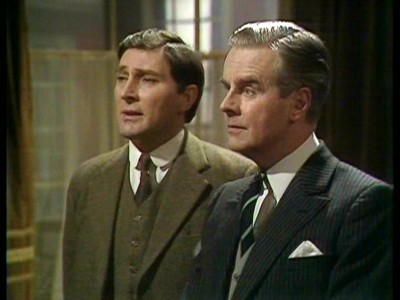
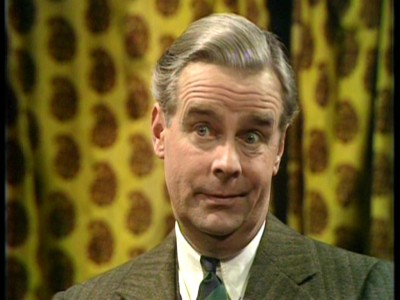
The DVD:
The Video:
If you've seen one of these full-screen, 1.33:1 transfers from original 1970s BBC materials, you've probably pretty much seen them all. Don't expect digital perfection, and you'll be fine. The transfer itself is adequate, but the original materials suffer from dirt, video noise, plenty of grain, and either muddy (16mm) or faded (video) color. Still, you're not watching these for 70mm Ultra Panavision™ vistas, but for the performances and the funny lines.
The Audio:
The Dolby Digital English 2.0 stereo audio mix is subject to the ups and downs of the original materials. Dialogue is heard well enough, but it drops in and out (but only a few instances). English subtitling helps.
The Extras:
There are two snippets of an interview with Ian Carmichael, from 2000, where he speaks briefly about his career and the Wimsey series. I would have preferred the entire interview (we only get a total of about 12 minutes here, and it's obviously chopped up), but it's still great to see the star (particularly since he just passed a few months ago). There are also some text features, including a bio of Sayers and Carmichael.
Final Thoughts:
Fans of vintage British television mysteries will have to add The Lord Peter Wimsey Mysteries: Set One to their collection, just for Ian Carmichael's delightful interpretation of Dorothy L. Sayers' bon vivant amateur sleuth, Lord Peter Wimsey. The first film here is the strongest, but they're both worth a try on a rainy Saturday evening. I highly recommend The Lord Peter Wimsey Mysteries: Set One collection.
Paul Mavis is an internationally published film and television historian, a member of the Online Film Critics Society, and the author of The Espionage Filmography.


|
| Popular Reviews |
| Sponsored Links |
|
|
| Sponsored Links |
|
|
| Release List | Reviews | Shop | Newsletter | Forum | DVD Giveaways | Blu-Ray | Advertise |
|
Copyright 2024 DVDTalk.com All Rights Reserved. Legal Info, Privacy Policy, Terms of Use,
Manage Preferences,
Your Privacy Choices | |||||||









